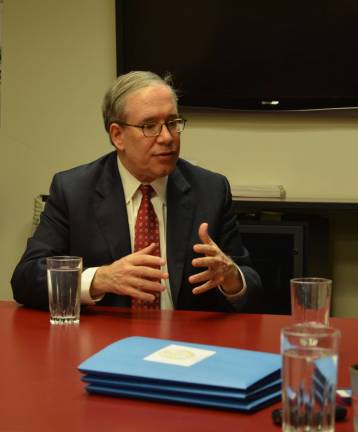Making waves, one audit at a time Politics

When asked how he’s decided where to direct his office’s firepower over the past year, Comptroller Scott Stringer has a simple rely: “That’s the comptroller’s job.”
He’s right, of course. But the job of the comptroller has traditionally been a thankless one, rarely making headlines and mattering little to New Yorkers who don’t concern themselves with how the city is investing its massive $160 billion pension fund.
Stringer had expected to run for the position unopposed, and it wasn’t until former governor Eliot Spitzer jumped into the race that voters, and the media, began asking, “What does the comptroller do, exactly?”
Stringer has spent the past year in office answering that question -- and vastly expanding his definition of the role. The result has been a high-profile perch for Stringer, and early talk about higher office in the next election. Stringer’s broader-than-usual definition of the comptroller’s job brings back memories of Rudy Guiliani’s headline-making tenure at the U.S. Attorney’s office -- which led to his election as mayor -- and even Spitzer’s early take on the AG’s job.
For instance, the comptroller’s office launched ClaimStat, a seemingly wonky tool that could have a big impact on the city government’s efficiency and budget. ClaimStat tracks, analyzes and makes public where claims against the city come from, providing data that Stringer said can be used to reform agencies to avoid costly claims in the future. One example, he explained, would be if there were a series of lawsuits decided against a particular NYPD precinct for similar infractions, Stringer could hand this data over to Commissioner Bratton, who might see fit to retrain some of his officers or install new leadership, to avoid similar claims in the future. ClaimStat also provides another way to track pedestrian injuries and deaths that result from collisions with city-owned vehicles, which dovetails with Mayor de Blasio’s efforts on Vision Zero to reduce traffic fatalities.
It’s these real-world examples – ones that coincide with issues stirring the city at the moment – that make Stringer’s version of city comptroller stand out. Stringer said that he doesn’t just want to issue reports, he wants to offer solutions. After his office concluded an audit of the troubled Citi Bike system, finding “poor maintenance” and “shoddy oversight” of the program, he also recommended that the program expand to serve more neighborhoods. “You want to have an impact,” he said, in an interview just before the holdiays. “Part of looking at these issues is to get a result. The old way of implementing Citi Bike was very problematic. We did an audit while also advocating for an expansion.”
The comptroller’s office also peered into the depths of the Department of Education – what Stringer calls “the least transparent city agency” – as well as the finances of the New York City Housing Authority, and found that both agencies left hundreds of millions of dollars in available federal money on the table in 2013. The DOE lost $300 million in funds for computer training for students, for example. NYCHA pushed back against their audit, calling it “seriously flawed,” but Stringer stands behind the audit’s recommendations and hopes to see some of them implemented.
“I’m not trying to do this just to say ‘gotcha,’” he said.
But he isn’t shy about wading into controversy. When asked why he’s chosen to begin a year-long audit of several of the city’s charter schools, including the powerful Success Academy run by former city councilwoman Eva Moskowitz, Stringer said, “I’m supposed to.”
By that he means that he’s acting at the strong behest of New York State’s First Deputy Comptroller Pete Grannis, who late last year wrote a letter to Mayor de Blasio urging more fiscal oversight of charter schools. A similar plea made last year to the agencies that are supposed to monitor charter schools – the city’s Department of Education, the New York State Education Department, and the State University of New York – by Grannis fell on deaf ears. Now Stringer is picking up the slack. It doesn’t escape him that entering the charter school debate will make a splash.
“I don’t look at it as a political fight with Eva Moskowitz, or anybody,” Stringer said. “No one likes an audit. It’s just part of government.”
The charter school audit won’t be finished for months. In the meantime, Stringer plans to continue his path with “more hard-hitting audits” and also hopes to refinance the city’s debt again to take advantage of low interest rates – the unsexy but traditionally crucial role of the comptroller. He’s also hopeful that the city budget will have an easier time passing this year, since the mayor has settled over 70 percent of outstanding labor contracts that had been looming over the city’s finances.
Stringer wants to go even further, though, “beyond four-year spending,” he said. It’s about the city’s long-term economy. “My goal is to create a platform for the traditional, aspirational city that we live in,” he said. “Children of low-income parents should aspire beyond the minimum wage.”
It’s a tall task for any elected official, especially for one without the high-profile role of a mayor or council speaker. But Stringer is confident, and he hopes to tackle the city’s big problems methodically, one audit at a time.
“I’m not the guy you want at the party,” Stringer said. “But that’s my job.”